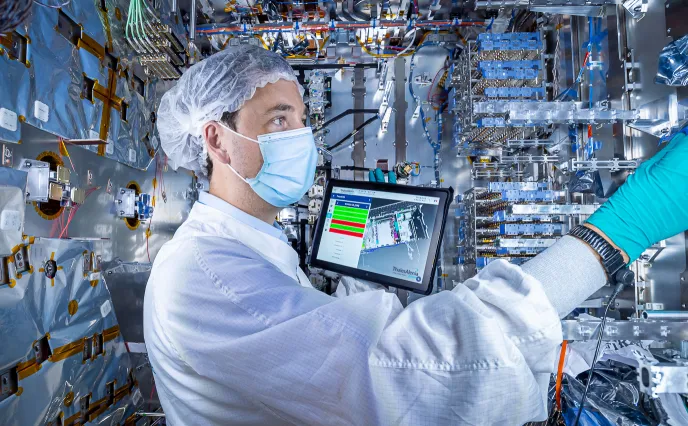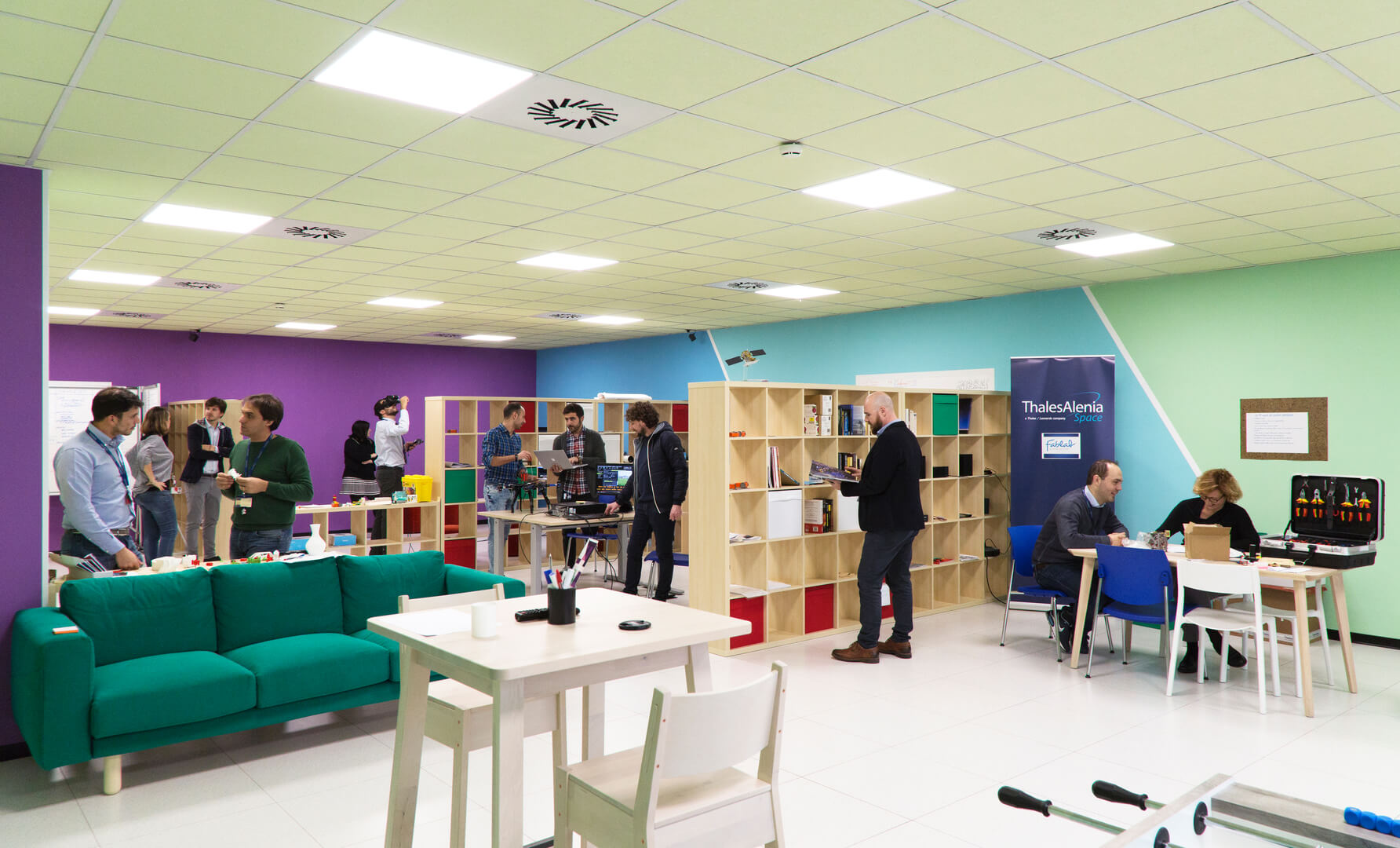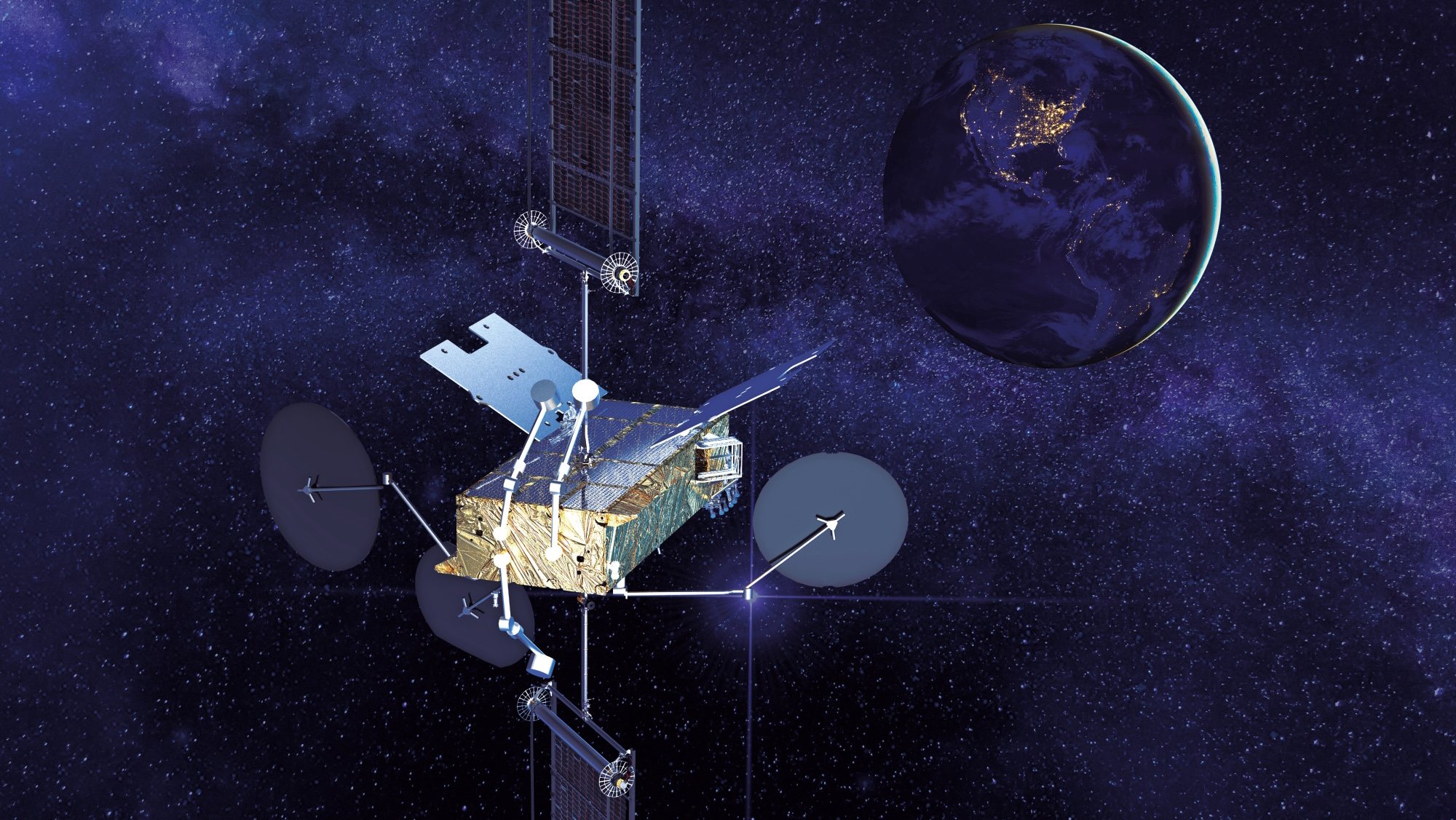Our Innovation Cluster
An innovation catalyzer and accelerator
Our Innovation Cluster
An innovation catalyzer and accelerator

The most striking achievements at Thales Alenia Space are driven by a culture grounded in innovation. To take just a few examples: we were at the forefront of satellite navigation systems in Europe; we were always convinced that all-electric telecom satellite platforms would become the new standard, as would flexible digital payloads; and quite early in the game, we also bet on highly flexible software-defined telecommunications systems that are reconfigurable in orbit.
A pioneer in satellite constellations, Thales Alenia Space has capitalized on this unrivaled technological legacy to address emerging business opportunities in the so-called “new space” environment, working with the entire space ecosystem, including small businesses and startups. Today, we’re ready to design the space programs that will meet fast-evolving market requirements.
Innovation Cluster, a pivotal part of our transformation strategy
Created in 2014, the Innovation Cluster aims to spawn disruptive industrial, technical and commercial concepts at Thales Alenia Space, and to foster an entrepreneurial mindset among our employees. The Cluster is a pivotal part of Thales Alenia Space’s transformation strategy, spurring a greater focus on innovation and with the aim of stimulating intrapreneurship and creativity. Open to everybody in the company, this network supports and funds innovative and value-added projects submitted by employees across all sectors.
It therefore acts as an incubator to support the ideation and development of disruptive concepts. The Innovation Cluster provides an excellent fit with our R&D units and covers all Thales Alenia Space entities. It’s a highly agile structure than can instantly provide the funding and resources needed to quickly validate new solutions that address emerging market needs, while also providing our customers with state-of-the-art technologies and novel development paths.
Intrapreneurship and open innovation
The Innovation Cluster is a structure that blends legacy and “new space” approaches to innovation. Focused on generating value right from the outset, the Innovation Cluster applies its investment strategy in day-to-day and disruptive innovation both in-house and outside the company. In-house, the Innovation Cluster incubates creative projects based on strategic medium-term goals, using the same principle as for startups: priming then ramping up to develop a product line, or to pursue the project with strategic and/or financial partners.
Outside the company, the Cluster has deployed an open innovation approach, meaning it fosters innovation with other partners. The startups most likely to become suppliers, partners, or even partners with cross- shareholding arrangements, are identified, monitored and analyzed to define and launch the actions needed. Thales Alenia Space plays a strategic role, with a personal investment based on contributing its people’s technical and business expertise. Given the fast-moving new space environment, Thales Alenia Space also seeks to minimize risks by looking at all options and making reasoned decisions – but that doesn’t stop the company from investing in promising new growth markets. For instance, by creating the joint venture LeoStella to build BlackSky, a 60-satellite Earth observation constellation offering high revisit. Teaming arrangements may also include support without a capital investment, especially for potential suppliers. This would help startup partners to enhance their skills and give both parties a better understanding of each other.

©Thales Alenia Space
In short, it’s vital for Thales Alenia Space and the Innovation Cluster to stay in close contact with startups and the innovation-based ecosystem, so they can identify and select the best partners and establish an appropriate relationship with internal startups or traditional entities, thus fostering a real win-win relationship.
"Absolutely FabLabulous"

©Thales Alenia Space
Our FabLabs are another idea incubator. Open to all Thales Alenia Space employees, they help people unleash their creativity by providing access to fast prototyping tools, encompassing both hardware and software. Above all, these FabLabs are forums for discussions and sharing that complement our current industrial organization. They help employees embrace the innovation culture by providing the resources needed to develop their own projects using a test & learn approach.
From the production standpoint, FabLabs help create products by proposing new solutions and giving us a foretaste of the technology to be developed, thus limiting the risk of errors. This approach has proven to be very useful, for example via the development of new tools used in volume production for constellations. The FabLabs, under the impetus of the Innovation Cluster, directly benefit creativity, intrapreneurship and innovation.
Thales Alenia Space now has four FabLabs, guided by the Innovation Cluster.
Success stories
The Innovation Cluster organizes #HelloSpace hackathons, which are team competitions organized in conjunction with all subsidiaries. The aim is to stimulate the innovation culture and generate initiatives, concepts and processes that could accelerate the development of disruptive projects within our company. For instance, the first #Hellospace, held in Turin in 2015, came up with the concept PIUME. Reflecting Thales Alenia Space’s expertise in crewed spaceflight and orbital infrastructures for the International Space Station, PIUME is a suite of modules capable of being used in extreme and harsh environments, including not only space, but also mountains, deserts and the Antarctic. It could be used for a variety of applications, including polar bases, dessert camps, forward posts, oil and gas rigs, etc.

©Thales Alenia Space
Another example, which actually spawned the Innovation Cluster, was a project to design a multispot telecommunications solution that uses specific bandwidths to address government and national sovereignty requirements. This approach proved decisive in the battle to win the Bangabandhu Satellite-1 contract, a satellite that is now helping to bridge the digital divide in Bangladesh.
Thales Alenia Space has recently won contracts to build four geostationary communications satellites based on the new Space Inspire product line, an all-digital solution that’s also reconfigurable in orbit. The company’s R&D department and the Innovation Cluster teamed up a few years ago to conceive a line of standard projects, dubbed “mini-geo” at the time and featuring a very compact satellite design. The new Space Inspire line integrated this compact shape, derived from mini-geo, as the basis for Thales Alenia Space’s new communications satellite family. It has undergone a number of modifications since then and also became fully digital to address the current needs of telecom operators.
Thanks to these achievements, our Innovation Cluster won an Innovation Team Best Practices 2019 Award from the Paris Innovation Directors Club, bringing together a number of leading listed French companies. The award was given in the Innovation Strategies and Management category.
